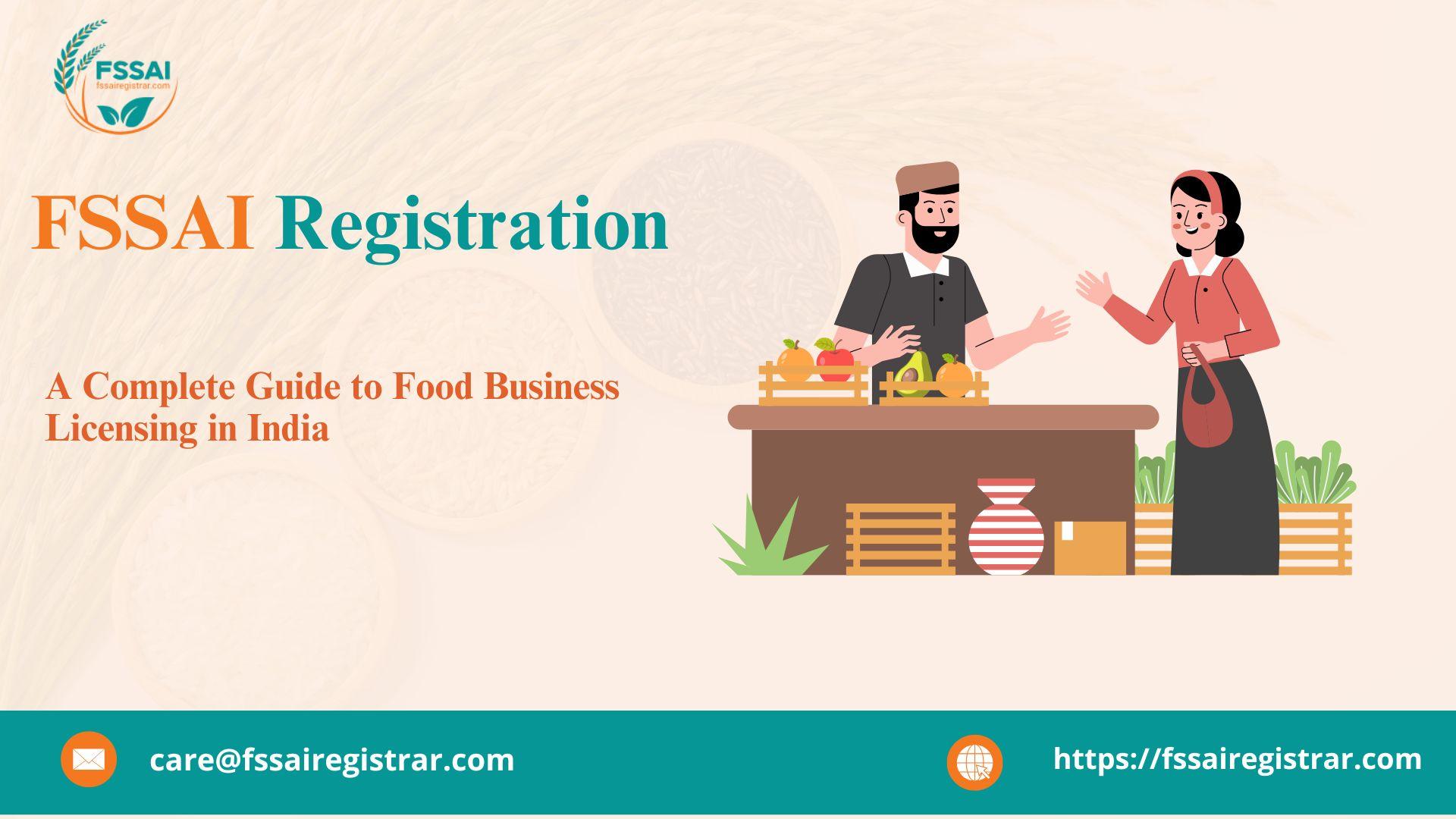FSSAI Registration: A Complete Guide to Food Business Licensing in India

Food is one of the most essential parts of our daily lives, and in India, it’s also one of the fastest-growing business sectors. From small food stalls to large restaurants, from packaged snacks to online delivery startups, the food industry is booming. However, before any food-related business can operate legally, it must obtain a license from the FSSAI (Food Safety and Standards Authority of India).
This article is your complete guide to FSSAI Registration, explaining what it is, why it’s important, who needs it, the types of licenses, the step-by-step registration process, documents required, and much more.
What Is FSSAI Registration?
FSSAI Registration is a legal process through which a food business in India obtains approval to operate in accordance with the standards set by the Food Safety and Standards Authority of India (FSSAI).
The FSSAI is a statutory body established under the Food Safety and Standards Act, 2006, to regulate and monitor food safety across the country.
Every food business operator (FBO), whether it’s a small vendor or a large manufacturer, must obtain either an FSSAI Registration or an FSSAI License, depending on the business scale and type.
Once registered, businesses receive a 14-digit FSSAI license number that must be printed on all food packages and displayed at the business premises.
Why FSSAI Registration Is Important
Getting FSSAI registration is not just a legal requirement — it also ensures trust, transparency, and credibility. Here’s why it’s essential:
-
Legal Compliance: It is mandatory under Indian law for any business dealing with food.
-
Consumer Trust: Customers trust FSSAI-registered brands more because they meet safety standards.
-
Quality Assurance: Ensures that the food served or sold is safe for consumption.
-
Business Growth: Helps you expand your business and sell through reputed platforms like Swiggy, Zomato, or Amazon.
-
Avoids Penalties: Running a food business without FSSAI registration can lead to heavy fines and even business closure.
In short, FSSAI registration is the foundation of a safe, trusted, and legally compliant food business.
Who Needs FSSAI Registration?
Every Food Business Operator (FBO) in India, whether large or small, must obtain an FSSAI registration or license. This includes:
-
Food manufacturers and processors
-
Restaurants, cafes, and hotels
-
Food packaging and storage units
-
Online food delivery services
-
Caterers and canteens
-
Retailers, wholesalers, and distributors
-
Importers and exporters of food products
-
Transporters involved in food logistics
-
Home-based food businesses or bakers
Even small vendors, petty retailers, or home kitchens selling food online must register with FSSAI.
Types of FSSAI Registration and Licenses
Depending on the scale and turnover of your food business, there are three categories of FSSAI registration:
Basic FSSAI Registration:
-
For small food businesses with an annual turnover of up to ₹12 lakh.
-
Suitable for home kitchens, petty retailers, small vendors, and small food stalls.
-
Simple registration process with minimal documents.
State FSSAI License:
-
For medium-sized businesses with a turnover between ₹12 lakh and ₹20 crore.
-
Applies to restaurants, medium manufacturers, storage units, and transporters.
-
Issued by the State Food Safety Department.
Central FSSAI License:
-
For large businesses with a turnover above ₹20 crore or those involved in import/export.
-
Required for large manufacturers, food exporters, importers, and multinational companies.
-
Issued by the Central Government Authority.
Benefits of FSSAI Registration
Having an FSSAI registration offers multiple benefits for food business owners:
Builds Consumer Confidence
An FSSAI number on packaging assures consumers that the food is safe and manufactured under regulated conditions.
Expands Market Reach
FSSAI-registered businesses can easily supply food to government institutions, online marketplaces, and corporate clients.
Legal Protection
Protects the business from legal penalties and enhances credibility before food safety authorities.
Enhances Business Image
An FSSAI logo symbolizes trust and quality, making customers more likely to choose your brand over unregistered competitors.
Access to Government Schemes
FSSAI-registered businesses can benefit from various government initiatives, subsidies, and training programs in the food sector.
Documents Required for FSSAI Registration
Before applying for FSSAI registration, keep the following documents ready:
For Basic Registration
-
Applicant’s photo and ID proof (Aadhaar/PAN/Voter ID)
-
Proof of business address (electricity bill, rent agreement, etc.)
-
Details of food items handled
-
Declaration form (Form A)
For State or Central License
-
PAN Card of the business or owner
-
Incorporation certificate or partnership deed
-
List of food products
-
Layout of the food processing area
-
NOC from local authorities
-
Water test report (if applicable)
-
List of directors/partners
-
Import/export code (for import/export business)
Ensure all documents are scanned clearly before uploading during the online process.
Step-by-Step Process for FSSAI Registration Online
Getting your FSSAI registration has become very simple with the online process. Follow these easy steps:
Visit the Official Website: Go to the official FSSAI registration website to start your application.
Enter Your Details: Fill in basic information like your name, phone number, email, business name, address, and the type of food you handle.
Upload Your PAN Card: Take a clear photo of your PAN card and upload it as part of the form.
Review and Submit: Double-check all the details you’ve entered. Once everything looks correct, hit the "Submit" button.
Make the Payment: Pay the required fee online through UPI, debit/credit card, or net banking. The fee depends on the size and type of your business.
Verify with OTP Call: You’ll receive a phone call to verify your mobile number. Share the OTP (one-time password) you receive.
Inspection(If Required): In some cases, an FSSAI officer might visit your business location to check hygiene and cleanliness.
Get Your License: After processing, your FSSAI registration/license number will be sent to your registered email ID.
Validity and Renewal of FSSAI License
FSSAI registration is valid for a period ranging from 1 to 5 years, depending on the plan chosen at the time of application.
Businesses must apply for renewal at least 30 days before expiry to avoid penalties or cancellation. Renewal can also be done easily online by logging into the same portal.
Common Mistakes to Avoid During Registration
-
Providing incorrect business information
-
Uploading unclear or mismatched documents
-
Using personal email or phone instead of a business contact
-
Forgetting to print and display the FSSAI number
-
Missing the renewal deadline
Avoiding these mistakes ensures a smooth registration process and long-term compliance.
Note:- Now you can easily apply for Tatkal FSSAI Registration
Conclusion
FSSAI registration is the backbone of food safety and quality assurance in India. Whether you run a home-based kitchen, a small café, or a large manufacturing unit, obtaining your FSSAI license ensures your business is legal, trusted, and compliant with national food safety standards.
It not only protects your customers but also strengthens your brand’s reputation and opens doors to new growth opportunities.
So, if you’re planning to start or grow your food business, apply for FSSAI registration today and build a brand that consumers can trust with confidence and safety.








